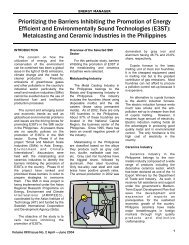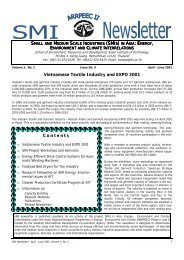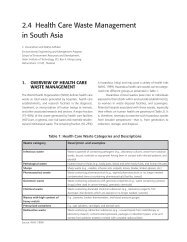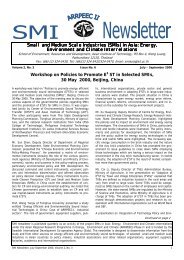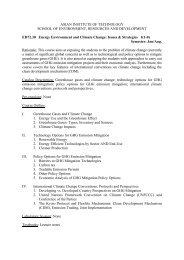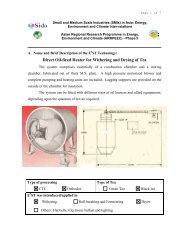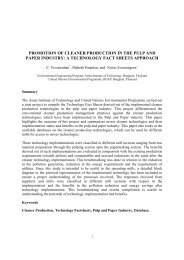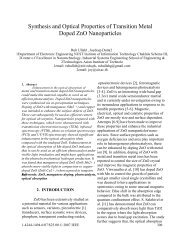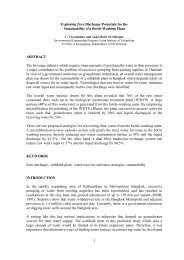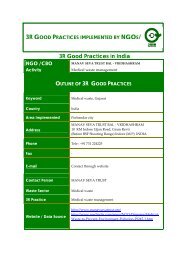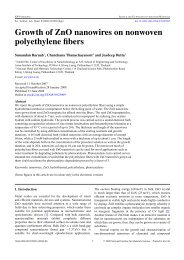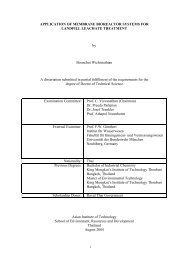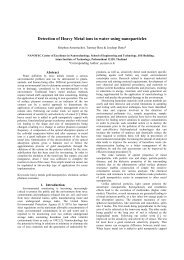A Gap Analysis in Selected Asian Countries, 3R Knowledge Hub ...
A Gap Analysis in Selected Asian Countries, 3R Knowledge Hub ...
A Gap Analysis in Selected Asian Countries, 3R Knowledge Hub ...
You also want an ePaper? Increase the reach of your titles
YUMPU automatically turns print PDFs into web optimized ePapers that Google loves.
The M<strong>in</strong>istry of Environment has been<br />
pursu<strong>in</strong>g a three-fold policy to tackle the issue.<br />
The ma<strong>in</strong> objectives of the policy are:<br />
• Regulat<strong>in</strong>g packag<strong>in</strong>g materials such as<br />
expanded polystyrene i.e., styrofoam, s<strong>in</strong>ce<br />
1993, and various PVC packag<strong>in</strong>g materials<br />
s<strong>in</strong>ce 2001<br />
• Regulat<strong>in</strong>g packag<strong>in</strong>g methods to restrict<br />
over-packag<strong>in</strong>g<br />
• Gradually reduc<strong>in</strong>g packag<strong>in</strong>g material<br />
made from plastics each year<br />
HEALTHCARE WASTE<br />
Generation of waste from the healthcare sector<br />
<strong>in</strong> Korea has rapidly <strong>in</strong>creased over the past<br />
decade. Accord<strong>in</strong>g to the MoE, approximately<br />
34,000 tons of regulated healthcare waste was<br />
generated from nearly 45,000 healthcare<br />
facilities.<br />
National data shows that healthcare waste<br />
generation is skewed towards the largest<br />
generators- hospitals conta<strong>in</strong><strong>in</strong>g more than 100<br />
beds. Approximately 60% of healthcare waste<br />
came from hospitals, which account for only<br />
less than 0.7% of all generators. This <strong>in</strong>dicates<br />
that such facilities are the largest source of<br />
waste when compared to other healthcare<br />
facilities. The average amount of waste<br />
generated was about 70 tons/hospital <strong>in</strong> 2002.<br />
The generation rate of waste from general<br />
hospitals was found to be 0.48 kg/bed/day with<br />
the total number of beds at about 114,000. The<br />
amount of waste generated per cl<strong>in</strong>ic is<br />
significantly lower at 0.2 tons/year, although<br />
they represent more than 85% of all generators.<br />
Steam sterilization followed by <strong>in</strong>c<strong>in</strong>eration is<br />
the major treatment method for healthcare<br />
waste. About 90% of the total waste stream<br />
undergoes off-site treatment. The rema<strong>in</strong><strong>in</strong>g<br />
waste, less than 10%, is treated at on-site<br />
<strong>in</strong>c<strong>in</strong>erators or steam sterilization facilities at<br />
some general hospitals where <strong>in</strong>c<strong>in</strong>erators or<br />
steam sterilization is available. Only 12 out of<br />
the 292 general hospitals treat their own<br />
medical waste on-site by <strong>in</strong>c<strong>in</strong>eration, while<br />
two general hospitals employ steam<br />
sterilization with shredd<strong>in</strong>g of their medical<br />
wastes. In recent years, many general hospitals<br />
have stopped operat<strong>in</strong>g their on-site<br />
<strong>in</strong>c<strong>in</strong>erators because of the strict regulations of<br />
air pollutant emissions, especially diox<strong>in</strong>s, and<br />
their proximity to the city.<br />
F<strong>in</strong>d<strong>in</strong>gs<br />
Until 1999, healthcare was regulated by the<br />
Medical Law under the M<strong>in</strong>istry of Health and<br />
Welfare. These wastes were often mixed with<br />
municipal solid waste and commonly disposed<br />
of <strong>in</strong> municipal landfill sites or improper<br />
treatment facilities. Fac<strong>in</strong>g the management<br />
problems of medical wastes, the Korea<br />
National Assembly modified the Waste<br />
Management Act <strong>in</strong> 1999 to better control<br />
medical waste from the po<strong>in</strong>t of generation to<br />
its f<strong>in</strong>al dest<strong>in</strong>ation. The Korean MOE<br />
promulgated several regulations for def<strong>in</strong>ition,<br />
segregation, packag<strong>in</strong>g, track<strong>in</strong>g, and disposal<br />
of medical waste. However, the only available<br />
option for manag<strong>in</strong>g healthcare waste <strong>in</strong> South<br />
Korea, after 2005, is <strong>in</strong>c<strong>in</strong>eration. Alternatives<br />
like separation of waste at source and waste<br />
m<strong>in</strong>imization for <strong>in</strong>c<strong>in</strong>eration have not been<br />
successful <strong>in</strong> healthcare facilities.<br />
E-WASTE<br />
The rise <strong>in</strong> economic growth of Korea <strong>in</strong> the<br />
last two decades <strong>in</strong>creased the volume of ewaste<br />
steadily. The rapid growth of the IT<br />
<strong>in</strong>dustries particularly due to the pivotal role of<br />
semiconductor manufactur<strong>in</strong>g is the major<br />
driv<strong>in</strong>g force for the expansion of the domestic<br />
market.<br />
Three recycl<strong>in</strong>g centers of capacities close to<br />
900,000 units/year were established and are <strong>in</strong><br />
full operation to recycle e-wastes, especially<br />
refrigerators, wash<strong>in</strong>g mach<strong>in</strong>es and air<br />
conditioners. All waste televisions, <strong>in</strong> the recent<br />
years, are recycled on a commission basis by<br />
several private recycl<strong>in</strong>g plants. The recycl<strong>in</strong>g<br />
of waste personal computers and mobile<br />
phones is <strong>in</strong>significant when compared with<br />
the amount of estimated obsolete. Korea is<br />
mak<strong>in</strong>g consistent efforts to improve the<br />
recycl<strong>in</strong>g rate to the standards <strong>in</strong>dicated <strong>in</strong> the<br />
EU directives.<br />
Chapter 3: Country <strong>Analysis</strong><br />
75




